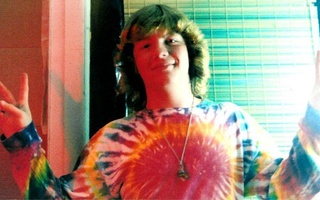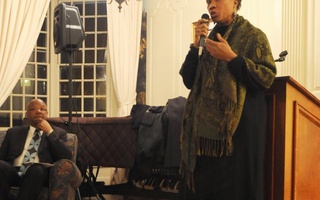"ALMOST EVERYONE in American is Unhappy," says in headline on the cover of the National Enquirer, the under-the-counter tabloid with a circulation of millions. The paper has been conducting unhappiness survey across the country.
"Look around you," their report begins. "You will be appalled at the unhappiness in the faces of your neighbors, your relatives, you friends, the clerk in the department store, the couple at the next table in the restaurant, the people waiting for a bus, the executive in his chauffeured limousine."
Why are these people unhappy? Because of the rat race, the article says. Because of competition and the pressure to get status. Boredom and too much leisure time. The helplessness of the ordinary man. "People used to trust their neighbors, but they don't anymore. Today everybody is looking out for himself," a Vermont farmer complains.
Texas mother doesn't have any friends. "The people are in a position of absolute frustration. They don't know what the hell to do," a San Francisco lawyer says. "Everything is so damned uncertain," says a sales manager from Georgia.
The biggest problem is people's inability to keep up with constant change, the article says. An educator in Portland, Oregon, sums up: "There probably has never been any other period in history when the thinking person as found himself in an environment filled with problems which seem to be pressing in on him."
This is the way average American explains what is wrong with his life. A newspaper reporter asks why people are unhappy and the man in the street replies, "We're too competitive. We're bored. "We're bored." He's not really answering the reporter's question. He's not telling why he's unhappy, but how he's unhappy. He gives synonyms. He tells what comes out of the computer running his life, but he doesn't know how it was programmed.
The man in the street isn't stupid. No amount of thinking could tell him or anyone else the reasons for the way he is. Everybody comes from the world, and the world is bigger than we are. The forces that shape our existence are too complicated for our minds to understand.
Lately some people shaped by a slightly different mixture of forces than the people the National Enquirer interviewed have come on the scene. The new people look at the old people and see that they are unhappy. The new people can't understand why the unhappiness exists either, but they have some ideas about how to avoid it. They say they will refuse to join the rat race. They conquer boredom by smoking pot and demonstrating. They trust each other and banish selfishness. They talk about love with approval. They escape frustration and insecurity by doing their own thing. They're not bothered by the turmoil of the times. They like change because they're young. They're the ones who cause change.
Optimists among both the old and new people say the changes are significant and will continue. They say the younger generation will improve the country's moral fibre. They say social conditions will get better and people will be happier. Skeptics disagree. They say every generation is idealistic when it starts out. They say these youths are not different from any other, except perhaps that more of them than usual are reckless hedonists. You'll learn, the skeptics say. Every person who ever lived on earth was once young and beautiful as you. There is no hope in that.
In one point the skeptics are wrong. There is at least one radical difference between present and former young people. Many of us have been taking LSD, and never before in history has there been so effortlessly direct a means of altering awareness as the ingestion of this chemical.
There is a distinction to be made. The hippie phenomenon in general, leaving the question of drugs aside, is seen as a rebellion against "middle class values." The hippies were, are, people who grew up in such a way that they could set the pitfalls in the lives of the people the National Enquirer is writing about. They developed an alternative, an anti-style. They substituted one set of rituals, roles and philosophies for another. But this reaction implies no greater awareness of themselves or the world than the people they were reacting to already had. Hippies don't necessarily have a deeper understanding, just a different understanding. There are as many pathetic and unhappy hippies as straight people.
The kind of awareness LSD has to do with is another matter altogether. The hip vs. straight, radical vs. liberal conflicts are cultural phenomena involving abstractions like "politics" or "lives." LSD trips are events dealing with real things like bodies. LSD doesn't play off one type of culture against another; it hits at the roots of cultural conditioning itself.
A new human being fresh off the assembly line experiences reality as an unplumbably mysterious infinite continuum. He can't manipulate reality because he doesn't separate himself from it. He doesn't have a language or a consciousness as we know it. Very quickly, however, our culture teaches him to break up the continuum of reality in a certain way, one of an infinite number of possible ways. He learns to take a few of the fragments, label them with words, and separate himself from them. The higher centers of his brain are conditioned through experience to organize the sensory input flooding the brain into constant discrete blocs. His consciousness becomes more and more complicated and abstract as he separates himself from the world and other human beings. He begins, to apprehend the world in a culturally conditioned, utilitarian way, not as it actually impinges on his senses and as his organism spontaneously reacts to it. Things begin to stand for words; things become illustrations of performed abstractions. Finally he is brainwashed.
Humanity couldn't survive without this process. We wouldn't have roast beef sandwiches or the Rolling Stones if we hadn't learned to think efficiently. But we also couldn't make bombs or be miserable.
When we take LSD we temporarily change the way our brain organizes sensory experience. Our perceptual constancies are ripped up like old flooring and we see clearly things usually distorted boy culture. We enter the country of lit-up-ness. Our senses become indescribably resonant. Thinking is not abstract and linear but concrete and multidimensional. Earth idea generates a thousand associations. The passage of time is forgotten. Every moment is a special occasion, every second is your birthday.
Read more in News
New Starters Lead Nine To 7-4 Win Over M.I.T.Recommended Articles
-
Rising State at HBS Opts Out of Rat RaceAt the end of Mark S. Albion's '73 first year at Harvard, his father came to visit him while attending
-
 A Roller-Coaster Year for Dining Halls
A Roller-Coaster Year for Dining Halls -
Golan to Donors: ’Tis Better To Give for the Arts Than To ReceiveWhen milling around outside his Wigglesworth Hall entryway one spring afternoon in 1975, first-year Jay E. Golan ’78 caught a
-
 Harvard, LSD, and the 1960s
Harvard, LSD, and the 1960s -
 Former Mayor Simmons To Run for Senate
Former Mayor Simmons To Run for Senate -
Need Help with Your Schedule?The entire drug classification system is archaic, unscientific, and rather harmful.













